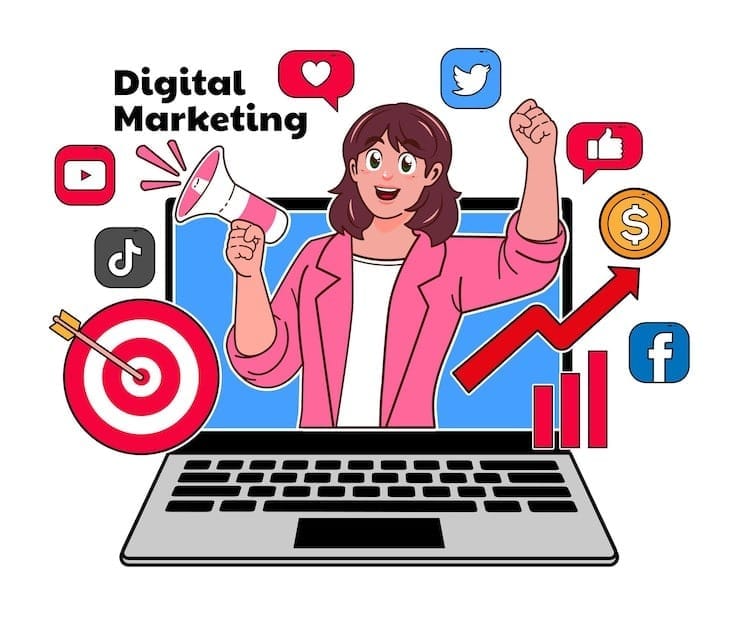Exploring How Digital Marketing Shapes Brand Identity in the Modern World
In today’s fast-paced and hyperconnected era, a brand’s identity is no longer defined solely by its logo, tagline, or product quality. Instead, it is shaped by the digital footprints a company leaves behind, from its social media presence to search engine rankings. Digital marketing has become the foundation for building, refining, and projecting brand identity in the modern world. With billions of people online, businesses are constantly competing for visibility and relevance, making digital marketing not just a strategy but a necessity.

While traditional advertising still holds value, the power of digital marketing lies in its ability to create dynamic, interactive, and personalized experiences. Whether it is through social media campaigns, influencer partnerships, or search engine optimization, digital marketing ensures that a brand is consistently visible, accessible, and appealing to its target audience. For businesses that want to thrive in this competitive environment, finding the right expertise and strategies can make all the difference. This is where professionals such as webratna website come into play, helping organizations craft an identity that resonates in a crowded digital landscape.
The Role of Building Strong Brands
Digital marketing has revolutionized how brands communicate with their audiences. Unlike one-way messaging in traditional media, today’s digital strategies encourage two-way engagement, where customers can interact with brands directly. This builds trust and creates stronger emotional connections.
A strong brand identity is built on consistency, authenticity, and relevance. Digital platforms allow companies to present a unified image across multiple channels while still tailoring messages for specific audiences. For example, a brand may showcase its professional expertise on LinkedIn, highlight creativity on Instagram, and engage with customer queries on Twitter. By aligning these interactions and implementing effective website optimization techniques, brands can enhance user experience, improve search visibility, and create a holistic identity that is both approachable and authoritative.
Social Media as a Brand Identity Driver
Social media platforms are perhaps the most powerful tools in shaping brand identity today. With billions of active users, they provide opportunities for storytelling, community building, and reputation management. Through carefully crafted content strategies, brands can project their values, missions, and personality.
Engaging visuals, behind-the-scenes stories, and user-generated content all contribute to how a brand is perceived. More importantly, social media gives customers a voice. Reviews, comments, and shares can amplify or damage brand reputation, making active engagement and transparency essential for maintaining a positive identity.
Content Marketing as the Voice of the Brand
Content is at the core of digital marketing. High-quality blogs, videos, podcasts, and infographics allow brands to showcase their expertise while building trust with audiences. Unlike traditional advertising, content marketing provides value by educating, entertaining, or inspiring customers.
By consistently publishing meaningful content, brands establish themselves as thought leaders in their industries. This not only attracts customers but also strengthens loyalty, as audiences come to rely on the brand for insights and solutions. In this way, content serves as the authentic voice of a brand’s identity.
Search Engine Optimization and Online Visibility
A strong brand identity cannot exist without visibility. Search engine optimization (SEO) ensures that a brand is discoverable when consumers are searching for relevant products or services. Ranking high on search engines not only drives traffic but also builds credibility. Customers often associate top search results with reliability and trustworthiness.
By optimizing websites with the right keywords, meta descriptions, and user-friendly designs, businesses can project a professional and credible identity. Furthermore, local SEO allows smaller businesses to build strong reputations within their communities, reinforcing their unique brand positions.
Influencer Marketing and Authentic Connections
Influencers play a critical role in shaping modern brand identities. By collaborating with individuals who align with their values, brands can tap into established communities of trust. Unlike traditional celebrity endorsements, influencer partnerships often feel authentic and relatable, strengthening a brand’s personality and credibility.
When executed well, influencer marketing not only increases reach but also reinforces brand values in a way that resonates with target audiences.
Analytics and Customer Insights
One of the biggest advantages of digital marketing is the ability to measure impact. Through analytics, brands can track how their identity is perceived and adjust strategies accordingly. Customer insights from website visits, social media engagement, and email campaigns provide real-time feedback on what works and what doesn’t.
However, it’s important to recognize that digital inequality can influence these insights, as not all audiences have equal access to technology or online platforms. This data-driven approach allows brands to refine their identity continuously, ensuring it remains relevant in a rapidly changing digital world while considering accessibility and inclusivity challenges.

The Future of Brand Identity in the Digital Age
As technology evolves, so too will the ways in which brands build identity. Emerging tools like artificial intelligence, virtual reality, and augmented reality are already transforming customer experiences. Brands that adopt these technologies early will not only stand out but also redefine how identity is expressed in the digital age.
At the same time, authenticity will remain crucial. Modern customers value transparency and purpose-driven branding. Companies that align their digital strategies with genuine missions such as sustainability, inclusivity, or innovation will find greater resonance with audiences.
You may also like to read: Exploring How Digital Marketing Shapes Brand Identity in the Modern World
Conclusion
Digital marketing is no longer a supplementary strategy; it is the foundation for shaping brand identity in the modern world. From social media storytelling to SEO-driven visibility, from influencer partnerships to real-time analytics, digital tools provide endless opportunities for brands to connect meaningfully with audiences.
As competition grows, businesses that embrace digital marketing will be able to craft identities that are not only visible but also trustworthy and inspiring. By combining creativity, technology, and authenticity, brands can thrive in the modern marketplace and remain relevant for years to come.